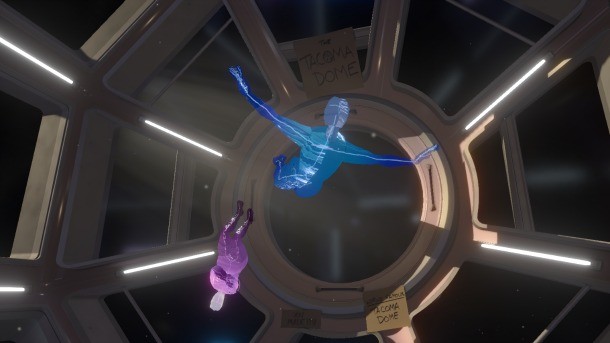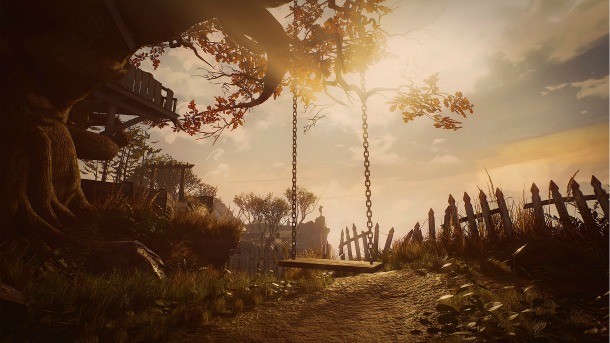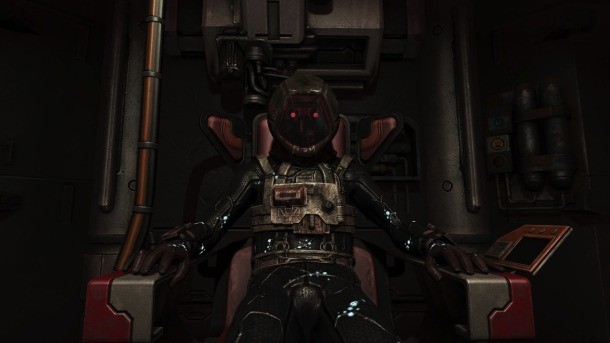Five Games That Make Us Think About Our Mortality

Last week saw the release of Tacoma, a game that tells an emotional, human story about a space station crew who find out they don’t have much longer to live. Stories about our mortality are powerful because they’re universal; at some point or another, each and every one of us will have to face death. The topic has been explored in a variety of media, but I think that the interactive nature of video games makes them a unique place to write these stories. There are certainly challenges developers must overcome to make us introspective about mortality; death is omnipresent in the medium, but it often feels more mechanical than thoughtful. In recent years however, more and more games have tackled the subject in unique and interesting ways. Here are five other games that make us confront death, feel anxiety, and think introspectively about the lives we lead.
The following article contains spoilers. If you’d just like the list of recommendations, go play Soma, What Remains of Edith Finch, Hotline Miami 2, To The Moon, and That Dragon, Cancer.

What Remains of Edith Finch
In What Remains of Edith Finch, you play through a number of vignettes that chronicle the deaths of Edith’s family members. From the outset, you know that every story you’re going to play through is going to end in tragedy, and each one tells a heartbreaking story that portrays death in a mindful way.
Some of these gameplay segments are abstract and beautiful. Gregory Finch drowned in the bathtub as an infant, but when you play through his scenario, your feelings of sorrow mix with those of wonder. You control a little toy frog and swim around in the bathtub as Tchaikovsky’s “Waltz of the Flowers” plays in the background. As you glide through the water, more toys join you in a delightful dance. The scene not only captures the young boy’s fascination with the world, but smartly gives room for his story to breathe. The choice to make it abstract necessitates that the player use their imagination to fill in the parts of the story they can’t see, which is arguably more powerful than actually displaying it on screen.
As you play more of these stories, you begin to feel the crushing weight of death that looms over this family. From a young age, all of these people were aware that death was coming and there was nothing they could do to stop it. Walter Finch locked himself in a bunker for decades in an attempt to avoid death, but he eventually realized that he wasn’t really “living.” When he dies immediately upon exiting his hideout, it’s heroic. If there’s one message that rings loudest in What Remains of Edith Finch, it’s that we can’t let fear of death get in the way of us living our lives.

Soma
Soma is built around classic sci-fi questions about the value we should place on the “lives” of artificial intelligence, and it forces you to directly confront them. You play as a robot whose “brain” comes from a scan of a man named Simon who died back in 2015. At the outset, you’re entirely convinced that you’re the same Simon; your consciousness picks up right where his left off after the scan. Your main objective is to make humanity (which has been annihilated by a catastrophic meteor impact) live on inside a computer that simulates a new Earth, full of AI who also originate from brain scans.
The most impactful moments of the story are those that involve turning off machines who are convinced they’re human, just like you were at the outset of the game. Some need to die for the story to progress, but things get more interesting when the game leaves the choices up to you. Robin is a happy, immobile robot who thinks she’s just hanging out in the simulation. Her power plug is conspicuous on her back. When I got to this encounter, it was empowering. There are times that the game is very direct with the questions it wants you to consider (some computers have surveys you can complete), but when you meet Robin, you’re the one asking the questions. What’s there to say about this “person’s” quality of life?
Things get even more difficult when you’re confronted with unplugging yourself, or, at least the self you once were. At multiple points, you have to copy yourself into another body, but that leaves the source of the copy alive. Those Simons are doomed to be stuck in this underwater facility until they die, so is it mercy to pull the plug? Is it easier to do so because they’re not “human” even though they used to be? No matter what choices you make in these decisions, they all display just how fragile life is. These interesting characters, with histories and personalities, can be turned off in seconds. One day, inevitably, they will run out of power and their entire existence will just be gone. It trivializes the complexity of human lives, and that’s tough to grapple with.

Hotline Miami 2
The music, the visuals, and the gameplay of Hotline Miami 2 all come together to put players into a new state of mind, one where brutal violence is not only normalized, but satisfying. Running into a room, blowing one man’s brains out, beating another to death with a nightstick, and then slitting another’s throat with a shard of glass is a thrill (which is terrifying in hindsight).
As you focus on painting the rooms with blood and chase high scores, the story sneaks up on you. You control several characters, all of whom have interesting arcs that unfold between the killing sprees. Just as you start to get engaged though, the ending hits you like a door kicked open by a man in a rooster mask. The final mission puts you in the shoes of a crazy mob boss who is high out of his mind. As you run through the level, people phase in and out of existence and you encounter giant animals like a two-headed goose. It ends with you running onto a rainbow… and off the roof to your death. It comes as a surprise, and just when you’re expecting to learn what happened, nuclear bombs abruptly wipe out everyone in the game.
I’d liken this story to Homer’s Iliad; it juggles the brutal glory of violence with the tragic costs. Death comes easy and ends the narratives we have created for ourselves. As the credits transition into the main menu, where the mellow sounds of The Green Kingdom’s “Untitled” blend with the imagery of a destroyed Miami, you’re left feeling empty.

To The Moon
In Freebird Games’ To the Moon, you play as two scientists who go into the brains of dying clients and then start changing their memories in order to fulfill their last wishes. Johnny Wyles’ wish is to go to the moon, so the scientists decide to go through his life retroactively to convince a young Johnny to become an astronaut.
The story is full of nontraditional subjects: love, marriage, mental illness, school problems, and more, but a heartbeat monitor in your inventory ensures that death hangs over the entire thing. Death certainly feels more present at the outset, when you're inside the memories of an older Johnny who struggles with the death of his wife, but even when you make it back to his childhood, you’re aware of how his life will end.
The game makes a strong connection between death and nostalgia. Over the course of our lives we make countless memories; we have moments of utter bliss, moments where we feel broken, and moments that fill us will regret. One of the game’s arguments is that these snapshots into our lives are no more or less important than our death – they’re just different. The shadow of death doesn’t take away from the lives we’ve lived; it’s just the end of our stories.

That Dragon, Cancer
That Dragon, Cancer is one of the most powerful games I've ever played, and that's largely because it's autobiographical. The project was created by Ryan and Amy Green, as a memorial for their son Joel, who was diagnosed with terminal cancer at twelve months old. Over the course of the game you experience both the highs and lows of this family’s battle with the disease. Pushing a laughing Joel on the swing and listening to him squeal with happiness while petting a therapy dog are magical scenes, but among these moments there are others that are heartbreaking. Sitting down with a doctor to discuss the short amount of time Joel has left is awful.
The experience of playing it yourself makes it even more impactful. Movement is limited, which both controls the pacing and reinforces Amy and Ryan’s feeling of powerlessness. During one scene, Joel begins to wail. You slowly comb the room, trying to find something to calm him down. The attempts to feed him don’t work, his cries consume you, and when the scene finally concludes, you feel completely and utterly drained. You can’t help Joel.
For me, the most impactful scene is one where you walk through the hallways of the treatment center and find brightly colored cards strung along the walls and scattered about the rooms. Up until that point, the game is intimate, focusing on one family’s battle with cancer, but when you get to the cards you realize that there are many stories like theirs. Each card holds a message from other families who’ve fought with this dragon. “The important thing is not that dragons exist, but that they can be beaten.” “For Scott, and the worlds we never built.” “Nada en el mundo me importa mas que mi hijo.” “I miss you, mom.” There are dozens upon dozens of these letters, and they’re filled with love, pain, and hope.
Are there some other games you’ve played that tell powerful stories about our mortality? Share them with us in the comments.

Get the Game Informer Print Edition!
Explore your favorite games in premium print format, delivered to your door.
- 10 issues per year
- Only $4.80 per issue
- Full digital magazine archive access
- Since 1991









